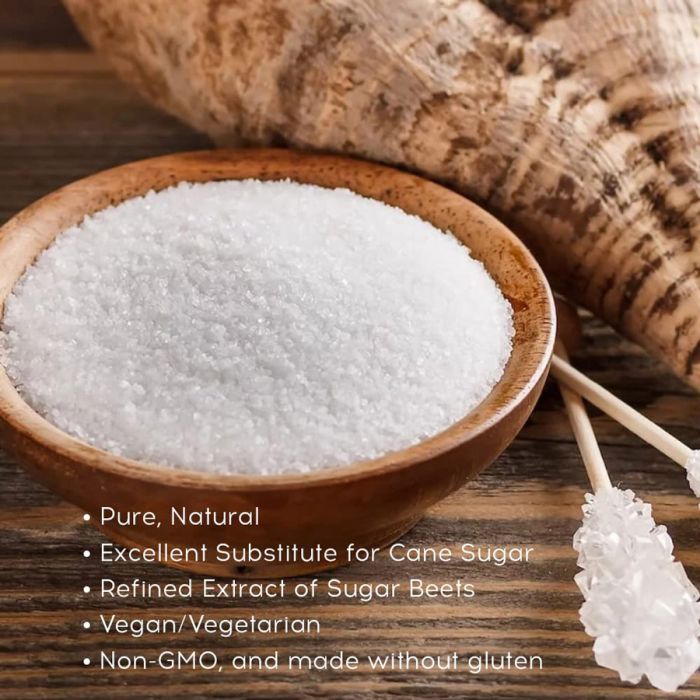When considering beet sugar vs cane sugar, some choose one for recipes while others select the alternative.
Exploring the Differences being used and Advantages In Between Beet Sugar Vs Cane Sugar
In the cooking world, the choice in between beet sugar and cane sugar is not merely concerning sweetness yet entails a nuanced factor to consider of taste, application, and influence. While both sugars originate from different plants, each undertakes distinct production processes that subtly influence their attributes and suitability for numerous meals. As cooks and consumers increasingly prioritize both the ecological and flavor profiles of their components, recognizing these distinctions ends up being critical. This exploration provides understanding into just how each sugar type can best enhance cooking developments.
Beginnings and Production Procedures of Beet and Cane Sugar

Walking stick sugar, on the other hand, comes from the sugarcane plant, a tropical grass native to Southeast Asia but now cultivated in exotic zones worldwide - beet sugar vs cane sugar. The production of cane sugar starts with the harvesting of cane stalks, which are crushed to launch the juice.

Nutritional Material and Health Considerations

When comparing the nutritional content of beet sugar and cane sugar, it becomes evident that both kinds basically give the exact same caloric values, with about 16 calories per tsp and no substantial nutrient variety. Each is composed practically entirely of sucrose, which is an easy carbohydrate that provides quick energy but does not have vitamins, minerals, or fiber. This resemblance prolongs to their effect on health, specifically worrying blood sugar level degrees. Both sugars, when consumed over, can add to elevated blood sugar degrees, a risk factor for diabetes mellitus and other metabolic conditions. Moreover, too much intake can lead to weight gain and oral problems, as both sugars are just as cariogenic, promoting dental caries. From a health viewpoint, moderating consumption of any kind of sugar, whether from beet or cane, is a good idea to avoid these possible you could try these out negative results on well-being. Therefore, neither holds a distinct advantage over the various other in terms of wellness benefits.
Taste Profiles and Culinary Applications
In spite of their similar chemical frameworks, beet sugar and cane sugar vary subtly in taste, which can influence their use in numerous culinary contexts. Cane sugar frequently lugs a hint of molasses, also in its polished form, offering a warm, caramel-like touch that improves baked items, coffee, and chocolate-based recipes. On the other hand, beet sugar is identified by its very improved, neutral taste, making it a functional sweetener that does not change the taste accounts of dishes.
Ecological Influence and Sustainability
While both beet and cane sugars are acquired from plants, their ecological influences differ significantly due to the distinctive methods of farming and processing required for each and every. Sugar beet cultivation usually involves considerable mechanization, which can boost fossil gas consumption and carbon emissions. Beetroots can be expanded in cooler environments and require less irrigation, possibly lowering water use compared to sugarcane. Sugarcane, on the other hand, is normally expanded in exotic regions where it depends greatly on watering and a much longer growing duration, raising its water impact.
Additionally, the handling of sugarcane usually generates a substantial quantity of waste, consisting of bagasse, which, although useful as biofuel, regularly adds to air contamination if melted inefficiently. Sugar beet processing makes check my site use of even more of the raw products, leading to less waste. Both sectors encounter difficulties in minimizing their environmental footprints, yet ongoing advancements in farming techniques and waste monitoring are aiming to boost sustainability.
Economic Variables Influencing the Sugar Market
The economic dynamics of the sugar market are substantially affected by international market needs and trade policies. In regions where sugarcane or sugar beet production is subsidized, producers may have a monetary benefit that allows them to supply reduced rates on the international market.
Additionally, fluctuations in worldwide demand for sugar, affected by dietary patterns and commercial usage in food, straight effect costs and manufacturing degrees. beet sugar vs cane sugar. Weather also play a critical role, as they can considerably impact crop yields and, consequently, the supply chain. This irregularity presents a degree of economic uncertainty that can cause investment volatility in sugar production markets, affecting decisions from planting to market technique
Conclusion
To conclude, both beet and cane sugar have unique qualities that suit various culinary needs. While cane sugar conveys an abundant flavor ideal for boosting baked products, beet sugar's neutrality is excellent for lighter recipes. Nutritional similarities regardless of, advice their distinctive production processes and ecological effects include intricacy to the choice in between them. Therefore, understanding these distinctions assists cooks and consumers make educated decisions that align with their wellness, culinary, and moral preferences.